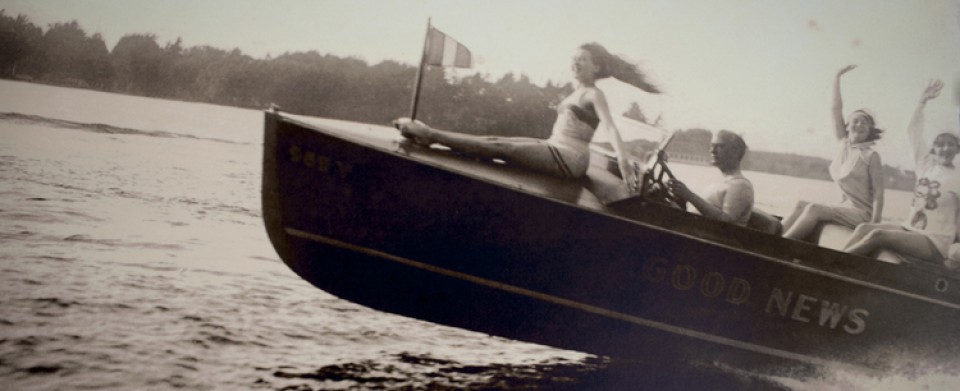I couldn’t pass this one by when I saw it in our local used book store.
Yes, the Main Street in my town still has a used book store. Aren’t you jealous? Good. Hold onto that feeling. Because jealousy is the quixotic principle that drives The Wife Sharers. 
The story opens with Howard in his next door neighbor’s pool with his next door neighbor’s wife, Serena, while he hears his own wife’s laughter over the redwood fence separating them from his own house party next door. The opening scene of this pulp novel is its best.
Swimming noiselessly as a pair of otters in the darkened pool, Serena and Howard could hear the drowsy chatter of the Lowes’ barbecue party…Howard Lowe could hear Enid’s shrill laughter on the other side of the fence…Most of the party hounds were trying to drink themselves cool this oppressive California night. That bearded goat, Mal Wenk, or some other tipsy oaf, had probably pinched Enid where she liked it. At the moment, Howard could not have cared less.
It’s California in the early sixties. There’s a lot of drinking. A ton of it. So much you worry about the characters’ health and safety. Especially Howard, who with his size, is really putting a strain on his heart.
The cover headline promises, “They agreed to share wives.” In point of fact, they didn’t agree on anything. It’s all a big con. A heretofore committed couple is convinced that their respective spouse wants what’s on the other side of the fence, and each is persuaded to let it happen.
Howard is smart (he’s a technical writer for an aerospace firm). He’s well-built. He’s chided as a “big ape,” a “caveman,” a “big brute,” but his stomach is flat (in spite of a lot of pancakes and steak), and he’s handsome. He’s rich and drives a jag. He’s the hero, I guess. At least the reader is led to believe he’s the preferred protagonist.
I’m like Enid and Serena. I adore big men. In spite of it, this is the most depressing HEA I’ve ever read. Of course, it’s not an HEA. It’s a work of pulp fiction, written by a man in 1963. So an HEA is not the point. I’m wondering, really, what was the point. The cover might give it away – a work of commercial fiction, the point was to sell books. Something this cover would have done in spades. Hell, I bought it, and for ten bucks.
Serena is the woman next door who problematizes the neighborhood barbecue by finding Howard more attractive than her common law husband, Mal Wenk. She is “the kind of girl a man dreamed about – too terrific to be true…sex ultrapersonified.”
Does the author really believe that women walk around naked and play with their nipples while waiting for a man like Howard to show up?
Mal is described as a ponytail poet with a beard like Maynard G. Krebs and a pot belly. A beatnick Pan. Mal sleeps each night on a straw mat on the floor of of the dining room. He is irredeemable. In the end, Mal’s beard is removed with scissors by Howard’s lithe and loving wife, Enid, while he’s asleep.
His shearing is a punishment for his writing a book about Enid. He is using their swap as a way to see into the life of a mousy housewife. Her removal of Mal’s beard is Enid’s symbolic “other side,” the finale of her character’s arc.
Husband Howard on the other hand doesn’t get through to anywhere. He spins in place. Howard loves Enid, from beginning to end. That’s a point in his favor. But he sleeps around, almost addictively, and collects phone numbers from waitresses across the city. His cheating is childish: his logic is flawed, and his lovemaking half-hearted. He ends up in bed with Enid’s best friend, falling drunkenly to sleep after fighting off her advances, until he wakes up at dawn inside her.
When he and Enid reunite in the end, there’s no triumph; it’s only a matter of course that he will continue cheating, continue to love her, and that they will both continue to be carried along on a current of booze and California swimming pools.
At least Adlon gets it. He knows his characters are depressing. That the lovemaking he describes isn’t really loving. That the sex he offers readers is sad, short-lived and unthrilling. This book isn’t meant to arouse readers like a woman’s HEA. This book was written for a man, a reader who believes in the addictive perseverance of marriage and the grotesque disappointment of what lies on the other side of that fence.
Folks, I’m not that reader. There’s still oodles of joy in the swims and the pinches.
